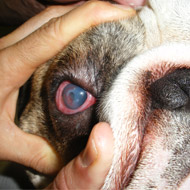
Risk of corneal ulceration increases significantly with age
Brachycephalic dogs are most susceptible to corneal ulcerative disease, new research has found.
As well as raising awareness among vets, breeders and owners, it is hoped that the findings will promote responsible breeding and help inform diagnosis and treatment.
In the study, experts from the Royal Veterinary College (RVC) analysed the records of more than 100,000 dogs across England.
They found that almost one in every 100 dogs will be affected with a corneal ulcer each year. Of the affected dogs, almost 60 per cent will need pain relief and just under one in five will require surgery.
The biggest finding, however, was the types of breeds that are most affected by corneal ulceration.
The findings show that brachycephalic dogs were 11 times more likely to be affected by corneal ulceration than non-brachycephalic dogs. Purebred dogs had over twice the risk compared with crossbred dogs. Spaniel breeds had more than three times the risk compared with non-spaniels.
Even more cause for concern were the findings for individual breeds. The team found that pugs had more than 19 times the risk of corneal ulceration compared with crossbred dogs. The findings also show that the risk of corneal ulceration increased significantly with age.
‘Some predisposition for corneal disease in brachycephalic breeds was expected but the level of the effect that we found was quite eye-opening and highlighted the importance of prioritising ocular health for vets, breeders and owners of predisposed breeds,’ commented study author Dr Dan O’Neill, an RVC epidemiologist.
Co-author Dr Rick Sanchex, a veterinary ophthalmologist, added: ‘Predisposition to ulcerative disease in brachycephalics was suspected but it was far from proven given the relatively small number of animals included in previous studies and the bias of the referral populations most previous studies were based on.’
In light of the findings, the Kennel Club is calling on owners, breeders and vets to be vigilant for corneal ulcerative disease.
“With some breeds having a markedly higher risk than others of developing corneal ulcerative disease, this research will enable breeders to make responsible breeding choices to protect the eye health of their dogs,” said Caroline Kisko, Kennel Club secretary.
“The Kennel Club and British Veterinary Association runs an eye testing scheme to test for inherited eye conditions so it would be sensible for dog owners to ask their vets about this and use it to protect the eye health of their dogs.”
The study ‘Corneal ulcerative disease in dogs under primary veterinary care in England: epidemiology and clinical management’ is published in Canine Genetics and Epidemiology.



 The latest
The latest